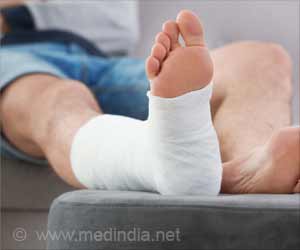Painkiller creams more effective than pills for chronic knee pain, NHS research suggests.
Painkiller creams and gels could be more effective than pills for chronic knee pain, UK’s NHS research suggests. Besides they had fewer side-effects.
It is estimated that a third of over 50s suffer from knee pain. In half of those the problem is classed as severe.The most common cause of pain in the knee is osteoarthritis - a condition caused by abnormal wearing of the cartilage.
A total of 585 patients from 26 general practices around the UK took part in a study
that looked specifically at non-steroidal anti-inflammatories (NSAIDs) - a class of drugs which includes ibuprofen.
Both tablets and creams containing the drugs had the same effect on knee pain, the study done at the Queen Mary University of London showed.
But those treated with oral medication had more minor adverse effects such as indigestion, increased blood pressure, or worsening asthma.
Advertisement
NSAIDs are well-known to be associated with sometimes serious side effects but the topical preparations deliver a smaller dose directly to the affected area and so are less likely to cause such problems.
NSAID lotions might provide an alternative to NSAID pills for treating knee osteoarthritis, Drs. Sanford H. Roth from Arizona Research and Education in Phoenix and J. Zev Shainhouse from Dimethaid Health Care Ltd, in Markham, Ontario, had suggested in the Archives of Internal Medicine three years ago.
The two investigators randomly assigned 326 people with osteoarthritis in at least one knee to apply 40 drops of topical diclofenac or a control solution to the affected joints four times daily for 12 weeks. Two hundred twenty eight participants completed the study.
The diclofenac lotion proved significantly more effective than the sham preparation for all outcomes, including pain, physical functioning, and stiffness.
Patients in the British study now preferred the gels and creams, it is reported on the National Institute for Health Research website.
Study leader Professor Martin Underwood, who has since moved to Warwick University, said there had been uncertainty about which to use.
"There has been quite a lot of discouragement about using topical NSAIDs because it was thought they were more expensive and there was not good evidence they were beneficial."
He added that patients with more widespread pain may find tablets are better and should discuss the choice with their GP.
Royal College of GPs chairman Professor Steve Field told BBC that he had always been of the view that oral NSAIDs worked better.
"This is an important message for GPs and patients - that they should consider topical treatments to avoid side effects."
An Arthritis Research Campaign spokeswoman told BBC that GPs had probably under-prescribed topical creams in the past because they did not believe they were as effective.
"But this new research appears to show they both as effective and safer, with fewer of the side affects associated with NSAID tablets," she added.
Source-Medindia
GPL/L










